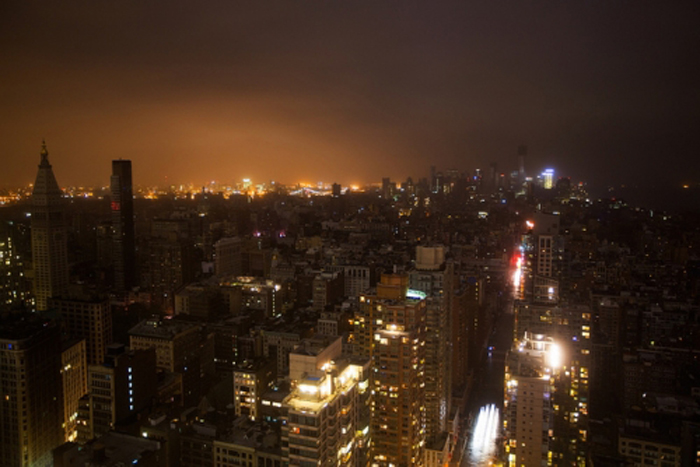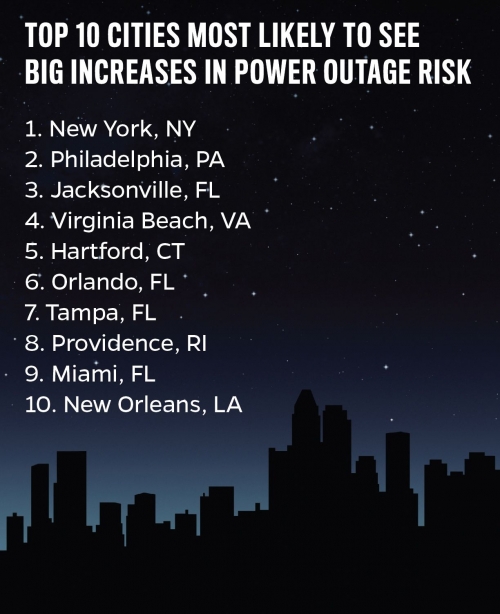Top 10 Cities That Will See More Storm Outages Revealed

Get the world’s most fascinating discoveries delivered straight to your inbox.
You are now subscribed
Your newsletter sign-up was successful
Want to add more newsletters?

Delivered Daily
Daily Newsletter
Sign up for the latest discoveries, groundbreaking research and fascinating breakthroughs that impact you and the wider world direct to your inbox.

Once a week
Life's Little Mysteries
Feed your curiosity with an exclusive mystery every week, solved with science and delivered direct to your inbox before it's seen anywhere else.

Once a week
How It Works
Sign up to our free science & technology newsletter for your weekly fix of fascinating articles, quick quizzes, amazing images, and more

Delivered daily
Space.com Newsletter
Breaking space news, the latest updates on rocket launches, skywatching events and more!

Once a month
Watch This Space
Sign up to our monthly entertainment newsletter to keep up with all our coverage of the latest sci-fi and space movies, tv shows, games and books.

Once a week
Night Sky This Week
Discover this week's must-see night sky events, moon phases, and stunning astrophotos. Sign up for our skywatching newsletter and explore the universe with us!
Join the club
Get full access to premium articles, exclusive features and a growing list of member rewards.
Hurricane Sandy left Lower Manhattan completely dark, eerily bereft of the electricity that keeps New York City buzzing 24 hours a day. Across town, 34,000 people living in the Rockaways, an exposed spit of land that acts as a barrier island, were left without power for weeks when the storm hit in October 2012.
On the heels of that devastation comes a new study that says New York City is among the cities most sensitive to increasing hurricane intensity, making it more likely that major hurricanes will cut off power to even more people, fueled in large part by climate change.
In a Johns Hopkins University study published this week in the journal Climatic Change, researchers used a computer model to show how power grids in coastal cities are likely to see more power outages from hurricanes in the coming decades. Climate change is expected to make hurricanes increasingly intense and damaging as the atmosphere warms.
After New York, the cities most likely to see an increased number of power outages during hurricanes are Philadelphia, Jacksonville, Fla.; Virginia Beach, Va.; Hartford, Conn.; Orlando, Fla.; Tampa, Fla.; Providence, R.I.; Miami and New Orleans.
“This would be cities at most risk of change — the cities our results would suggest would see the most change in the future if hurricanes became more intense,” study co-author Seth Guikema, assistant professor of geography and environmental engineering at Johns Hopkins, said.
In determining how vulnerable those cities’ power grids are to extreme weather in a changing climate, the researchers used a computer model to project how possible changes in hurricane activity may influence each city’s risk of power outages.
Weather-Related Blackouts Doubled Since 2003: Report Hurricanes Likely to Get Stronger & More Frequent: Study Studies Predict Fewer But Stronger Hurricanes Growing Threat of Worse Hurricanes
Get the world’s most fascinating discoveries delivered straight to your inbox.
Hurricane activity will not affect all the cities along the Atlantic and Gulf coasts equally in a warming world. The odds of a 100-year storm hitting New York or Philadelphia could be 50 percent higher in the future, which means more people could be affected by widespread power outages, the study says.
More intense hurricanes could cause 30 percent more people in some cities to have their power knocked out relative to current climate conditions, according to the study.
Lead author Andrea Staid, a Johns Hopkins doctoral candidate, said the study doesn’t measure increased risk over a specific period of time. She said climate change scenarios suggest hurricanes could become as much as 40 percent more intense than the historical average, increasing the vulnerability of cities already exposed to hurricane threats.
“If I’m mayor of Miami, we know about hurricanes, we know about outages and our system has been adapted for it,” Guikema said. “But if I’m mayor of Philadelphia, I might say, ‘Whoa, we need to be doing more about this.’”
The study does not account for climate change-driven sea level rise expected to exacerbate storm surges, saying that including hurricane storm surges in the research would not significantly affect the accuracy of its power outage predictions.
Con Edison, New York’s primary electric utility, took a cue from Sandy and is now in the second year of a $1 billion power grid fortification project to designed to protect it from widespread damage from severe flooding and high winds from major storms, Con Edison spokeswoman Joy Faber said.
Radley Horton, associate research scientist at the Center for Climate Systems Research at Columbia University who is unaffiliated with the study, said its authors are taking on tropical cyclones, one of the biggest climate uncertainties because hurricane hazards are not well understood and natural variability in hurricane activity is large.
“This study does not ‘weigh in’ in a serious way about how hurricanes may change in the future,” he said. “Rather, it is a simple sensitivity study, one that considers possible scenarios of how hurricane intensity, duration and location may change in the future. This approach is reasonable, given the large uncertainties about how hurricanes may change in the future.”
The study should also serve as a wake-up call for the cities it names, showing how vulnerable their power grids will be future hurricanes, he said.
Klaus Jacob, a seismologist and climate change adaptation and disaster risk management researcher at Columbia University’s Lamont-Doherty Earth Observatory, said the study is deficient because of its claims that storm surges do not substantially impact power electric power grids.
“And they do not account for effects of sea level rise,” Jacob said via email. “At least from our NYC and mid-Atlantic region, that is insufficient to estimate the combined climate change effects on power outages in the future. I am puzzled by this oversight.”
That means a more devastating future is in store for coastal cities than the study suggests, Horton said.
“While this study only considered winds, as we learned during Sandy, coastal flooding can devastate electrical systems as well,” he said. “And it is a given that sea level rise will increase that vulnerability to coastal flooding dramatically along most of the U.S. Gulf and Atlantic coasts.”
You May Also Like: Electric Cars a Mixed Bag For Health, Climate Trillions and Quadrillions: Numbers Tell U.S. Energy Story West Coast States Rule Electric Vehicle Adoption in U.S. NOAA: Climate Change Did Not Cause Calif. Drought Deadly Heat in Europe 10x More Likely Than Decade Ago
 Live Science Plus
Live Science Plus












